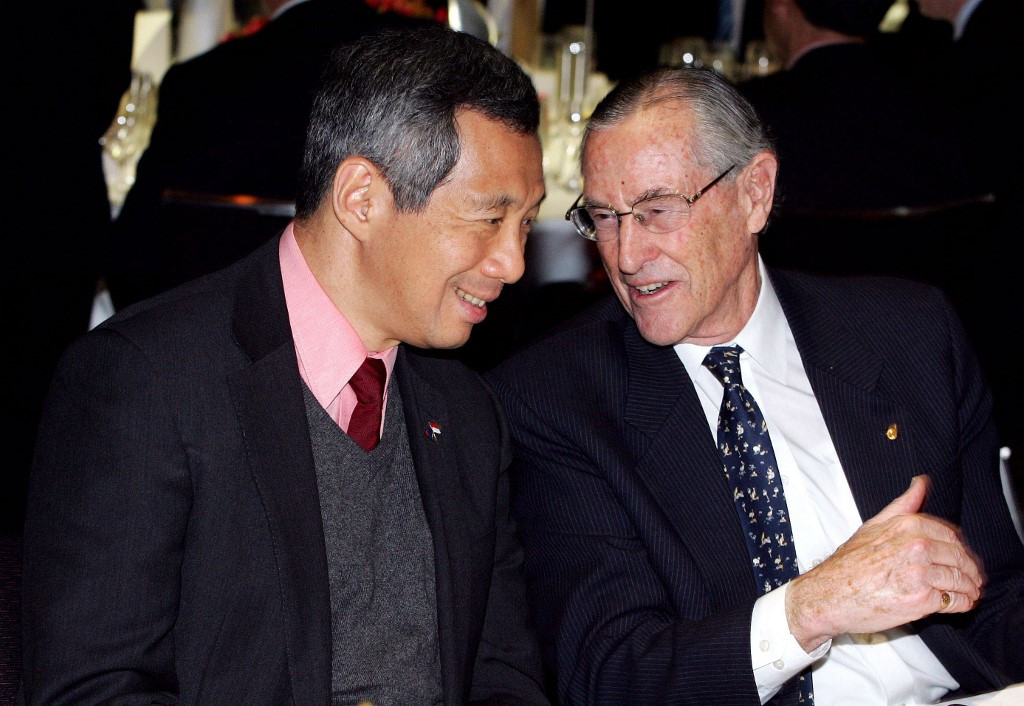Popular Reads
Top Results
Can't find what you're looking for?
View all search resultsPopular Reads
Top Results
Can't find what you're looking for?
View all search resultsDick Woolcott, Australia’s ‘giant’ diplomat, has left us
We remember him as the "friend" from Australia who tried very hard to be a "friend" to not only Indonesia, but also all our regional neighbors as well as Southeast Asia as a whole, through his indelible influence on Australia's foreign policy.
Change text size
Gift Premium Articles
to Anyone
A
ndrew Clark described Richard “Dick” Woolcott as a diplomatic “giant” in his obituary in Foreign Affairs & Security. I think this description fits what most of Dick’s friends in the Asia-Pacific, where he spent most of his many years as Australia’s top diplomat, feel about him.
Here, we remember him as the “friend” from Australia who tried very hard to be a “friend” to Southeast Asia. He served as the ambassador to Indonesia and the Philippines, and before that, in other capacities in Singapore and Malaysia. He was also involved in the withdrawal of Australian troops from Vietnam.
But his main and most difficult contribution was when Indonesia took over East Timor from the Portuguese and the critical aftermath, which culminated when East Timor became Timor Leste with Australian troops at the helm.
I first met him when I was accompanying Pak [Mr.] Ali Moertopo to Australia, New Zealand, Papua New Guinea, New Caledonia and Fiji at the end of October 1973, exactly when the Yom Kippur War started in the Middle East. Dick was the public officer who was in charge of the Australian part of the visit.
Our group flew in from Perth, and Dick was waiting at the Melbourne Airport where we landed in the morning of Oct. 6, 1973. He was extremely friendly in greeting Ali Moertopo, and most probably had received a briefing earlier from Jeffrey Forester, then a young foreign affairs officer at the Australian Embassy in Jakarta, about how well-meaning then-president Soeharto was toward Australia.
At that time, Soeharto considered Australia as playing a very critical role for Indonesia’s security. Soeharto continued to view our bilateral ties that way, amid some hiccups now and then in the relationship.
In this regard, Dick Woolcott’s presence in Jakarta as the Australian ambassador (1975-1978) had been one of the main factors of steady bilateral relations between our two countries. He was able to maintain balance between Indonesia’s view on the need for security in the Southeast Asian region, and Australia’s wishes of a plebiscite in East Timor. It was a tough period, with troops from Australia and ASEAN member states taking part to restore stability in East Timor.
East Timor has always been important for Australia. The Australian people were thankful to the East Timorese for their help in facing the Japanese incursion during World War II, in 1944-1945.
East Timor became a difficult issue between Australia and Indonesia. I believe it was Dick Woolcott’s steady hand and his willingness to be realistic in facing the problems that made it possible for Australia and Indonesia to overcome the problem.
Dick was also one of the key figures to implement Bob Hawke’s ideas and policies in establishing the Asia-Pacific Economic Cooperation (APEC) in 1989. He went around the Asia-Pacific to canvass this idea and because of his acumen, he was successful in preparing a regional institution as important as APEC, which is still relevant until now.
Dick maintained friendships with many regional leaders. In fact, he was on a first-name basis with most of them, which was a great factor of Australia’s diplomatic success in the region. His most important results and achievements have been his friendship with a lot of people in the Asia-Pacific, as well as in the world.
He also had a bright mind and an open and soft demeanor that made him welcomed by all. Dick was a hero for Australia and an excellent interlocutor for his country in the region.
We are surely going to miss him and wish his two sons all the best, while looking forward to keeping together our memory about the man, who was a hero to many.
It is heartening to know that he had such an extraordinary influence on the domestic political scene too, which made it possible for us to expect bipartisan policies and a balanced approach toward pursuing foreign policies in the longer term.
This made it possible for Australia to maintain its open and bipartisan approach toward the future, which is important to Southeast Asia and to many individual countries in the region.
We thank you, Dick, for your efforts and your achievements in Australia’s foreign policy that has benefited us all.
May you rest in peace.
-- The writer is vice chair of the Board of Trustees at the Centre for Strategic and International Studies (CSIS) Foundation.










